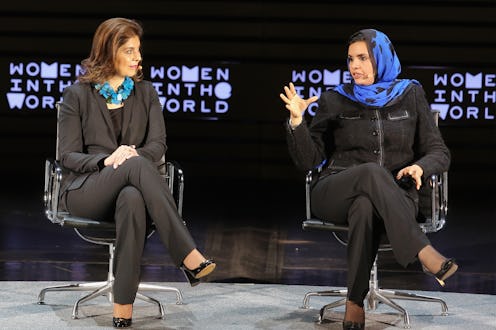News
This Panel On Islam Got Seriously Heated
On Thursday, emotions ran high as four Muslim-born women debated what future Islam holds for their gender, in the most heated and controversial panel at the annual Women in the World summit. The women's rights activists and scholars, all passionate about their beliefs, found themselves in an unintelligible argument (reminiscent of some 2016 presidential debates) on stage at Lincoln Center, without coming to any real consensus on whether or not Islam needed to fundamentally change to be less misogynistic. However, there was one thing they all agreed on, and it's one thing America must remember about Islam: The religion varies.
"Islam is not a monolith," said Farah Pandith, the former State Department special representative to Muslim communities and adjunct senior fellow at the Council on Foreign Relations. "There is great diversity within Islam. When you travel and talk to Muslim youth, you hear many different voices of what it means to be a Muslim woman. Muslim millennials do not want to be pigeonholed as one thing."
As with anything, the religion is different from person to person and place to place. Islam in Afghanistan doesn't look exactly like Islam in Saudi Arabia, Syria, Somalia, or anywhere else. Even two Muslim women in the same country can share very different outlooks.
As fears about the threat of ISIS intensify and some presidential candidates call for all Muslims to be kept out of the country and/or Muslim communities in America to be closely surveilled, it's important that the nation not lump together the 1.6 billion Muslims across the globe as a single entity. Since the Sept. 11 attacks, Muslims have faced the unfair stereotype that they're all potential terrorists, despite the fact that only radicalized Muslims commit violent acts of terror and Islam at its core teaches peace.
On an even larger scale than radicalized versus non-radicalized Muslims, women who practice Islam all have different experiences and thoughts on how the religion needs to become more gender equal. While human rights activist Ayaan Hirsi Ali argued that Islam oppresses women and needs to be altered, Zahra’ Langhi, co-founder and director of the Libyan Women's Platform for Peace, countered that some Muslims' interpretations of the religion need to be transformed, not the religion itself.
Every Muslim (or formerly Muslim) woman has different feelings about gender-specific Islamic practices and beliefs, so it's impossible to classify them all in one group. The most basic example of this is the varied feelings about wearing head scarves. Some Muslim women think it symbolizes oppression, while others proudly wear a scarf to show their religious identity and respect for their god.
Even if you know absolutely nothing about Islam, the Quran, or Sharia law, just know that the religion is extremely diverse. Just as there are large variations within Christianity and two Christians can't be assumed identical, Islam can be interpreted differently, and Muslims remain individuals.
